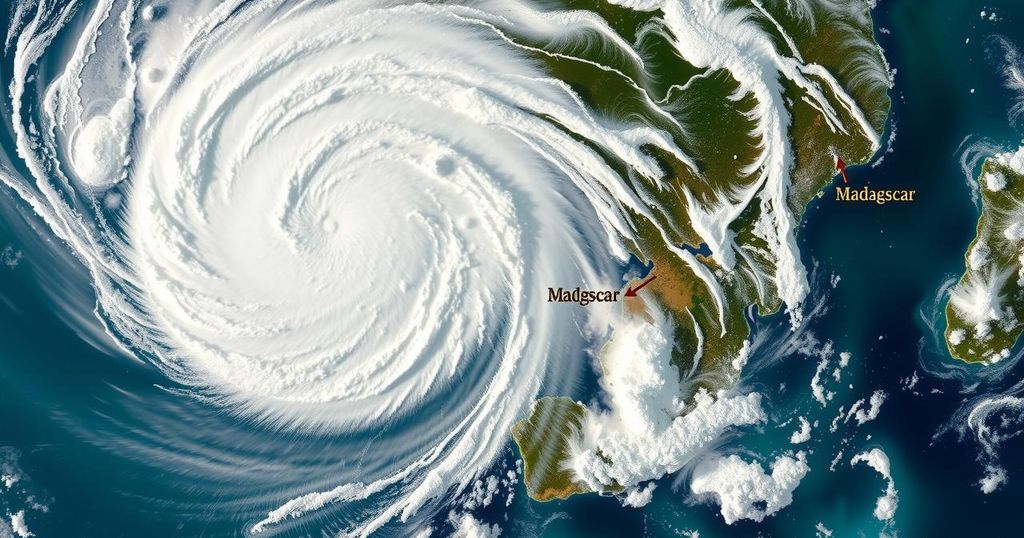Tropical Cyclone Chido: Impact and Preparedness in Southern Africa
Tropical Cyclone Chido is set to impact approximately 2.7 million people across six countries in Southern Africa, with Mozambique being one of the most affected areas. The cyclone is currently located near Madagascar and is expected to make landfall on December 15, 2024, necessitating extensive humanitarian preparedness and response efforts in the region. Significant rainfall and wind gusts are anticipated, leading to increasing risks of flooding and damage.
Tropical Cyclone Chido has severely impacted Southern Africa, with approximately 2.7 million individuals across six nations facing devastation. The affected countries include Comoros, Madagascar, Malawi, Mauritius, Mozambique, and Seychelles. As Chido makes its way to Mozambique, reports indicate that strong winds and heavy rainfall are expected, particularly in Cabo Delgado. Aside from Mozambique, Zimbabwe and Zambia are also projected to experience significant precipitation, while other nations such as Angola and the Democratic Republic of the Congo will face adverse weather conditions due to different systems.
Preparedness initiatives are currently being implemented, involving the spread of warnings to vulnerable communities and the repositioning of humanitarian supplies. Organizations are executing prevention strategies, including evacuations and pre-deployment of staff for effective local coordination. Additionally, the UN operational agencies are on standby to provide crucial assistance as needed.
Between December 7 and 10, Chido formed as a tropical depression, later intensifying to a Category 4 cyclone on December 10 before weakening. It is forecasted to approach Madagascar closely before heading to Mozambique. The cyclone’s approach will provoke storms, with wave heights predicted to reach between four to eight meters along affected coastlines. Maritime pursuits between specific coastal points have been advised against until the severe weather subsides.
In Madagascar, humanitarian partners are preparing for a possible assessment post-cyclone, although local access challenges persist. In Mozambique, an Emergency Preparedness Response Plan is in the works, along with mobilization of necessary resources. Malawi’s government is collaborating with humanitarian agencies to establish readiness protocols in anticipation of cyclonic effects.
This collaborative effort across various organizations underscores the importance of human resilience in the face of climatic adversity, working tirelessly to mitigate the forthcoming impacts of Cyclone Chido.
Humanitarian communications indicate a need for public awareness and community engagement to ensure proper evacuation measures are acknowledged and executed effectively.
Tropical cyclones are intense circular storms that originate over warm tropical oceans and are characterized by low atmospheric pressure, high winds, and heavy rain. The development of such systems significantly affects vulnerable regions in Southern Africa, necessitating coordinated emergency responses. Cyclone Chido is particularly impactful due to the anticipated flooding and high winds it brings, compounding the difficulties already faced by communities in these countries, which are often underprepared for such disasters. In the context of disaster management, organizations such as the U.N. Office for the Coordination of Humanitarian Affairs (OCHA), along with local authorities and non-governmental organizations, play a critical role in providing timely information, resources, and support to affected populations. Continuous monitoring and geospatial analysis enhance situational awareness crucial for effective response efforts in the aftermath of cyclones.
In conclusion, the passage of Tropical Cyclone Chido poses a significant threat to millions of individuals in Southern Africa, particularly in nations such as Mozambique and Madagascar. Efforts towards preparedness are underway across various organizations and agencies, including prompt communication and pre-deployment measures. The focus remains on mitigating the cyclone’s impacts through coordinated responses and community awareness initiatives, highlighting the importance of collaborative efforts in crisis management.
Original Source: reliefweb.int




Post Comment